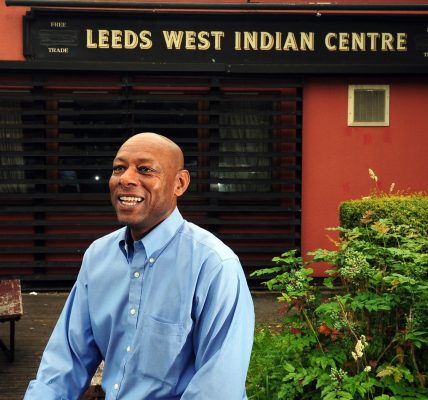Meet the Halifax bookbinder helping to keep his craft alive
Like many teenagers, Stephen Conway dreamt of becoming an artist.
“When I was 16 I really wanted to go to art college,” he says. “I had a bit of flair for art but my parents couldn’t afford to send me to art school so it was more a question of going out to find work.” Which is exactly what he did, spending six years as an apprentice at Edward Mortimer’s, a bookbinder in Halifax. “It was the closest thing I could find to being creative,” says Stephen.
That was more than 40 years ago. He became a professional bookbinder and in 1985 set up his own business, Stephen Conway (Bookbinders) Ltd, in Halifax, where he has lived all his life.
His bijou studio (he also has a small, adjoining bookshop) is a short walk from the Piece Hall. “We mainly do high-end bookbinding, so there’s a lot of leather binding and design bindings, as well as repairing valuable books,” he says.
The design bindings are made to commission and over the years Stephen has worked on everything from a 1930s edition of Shakespeare’s poems and sonnets for the Folger Shakespeare Library in Washington DC, to a new scrapbook and box for a collection of drawings by a British POW from the Second World War.
These special creations don’t come cheap, with an average design binding setting you back around £4,000 to £5,000.
His customers include collectors, libraries and universities, as well as people who want to preserve a piece of family memorabilia in a stylish way.
It takes Stephen up to 100 hours to complete a fine design binding. “You don’t do it all in one go. You don’t start on Monday morning and finish at Friday tea time. You’ll do it over a longer period and the design can change because you can do one little process that might lead to something else.”
As a member of Designer Bookbinders, one of the most prestigious societies devoted to the craft of fine bookbinding, Stephen is among those called on to create a special binding for the shortlisted authors of the Booker Prize.
“Every year when the shortlist comes out there are six books chosen and they ask six bookbinders to do a special binding on each of the titles. Those binders are all members of this society and those chosen do one book.” This is then presented as a gift from Booker to each of the authors.
It’s an honour for any bookbinder, though it’s also a challenge owing to the time constraints. “The shortlist usually comes out four weeks before they announce the winner, so you have four weeks to read the book, come up with a design and then make the binding. So the pressure is certainly on.”
Stephen has been chosen to do this eight times over the years, most recently in 2019. “It just so happened that I did Margaret Atwood’s book The Testaments and when the shortlist was announced it hadn’t even been published.”
The book was officially published the week prior to the prize-giving, which meant it qualified, and Stephen had to sign non-disclosure agreements before being given an advance copy. The Canadian author was joint winner that year and he got to meet her at the prize-giving ceremony when the authors were presented with their special editions.
So what did Atwood, one of the world’s greatest living novelists, think of his handiwork? “She was pleasant and very positive about what I’d done, so I think she liked it … I hope she did.”
The Booker special editions are made using leather bindings and the binders have carte blanche over what they create. “Margaret Atwood’s book is a dystopian novel with similar themes to George Orwell’s Nineteen Eighty-Four, it’s about state control. So with The Testaments, I did a barcode across the middle next to a fingerprint which ties in with the idea of society watching you and identification,” he says.
York-born author Fiona Mozley, who was shortlisted for the prize four years ago for her debut Elmet, is another author whose book he has worked on.
“That was set on the bleak US Moors and the idea was if you look across the moors in the winter you see the walls separating the fields and when it snows it’s blown into the corners of the fields and that’s what I tried to represent. The tiny dots on the cover represent the isolated little villages which I hand tooled with luminous paint so that in the dark they will actually glow as if the lights are on.”
It isn’t just limited editions and high-end commissions that Stephen does – he’s equally happy doing basic bookbinding. “If somebody walks in and asks if we can repair a Bible, or their dad’s favourite book, we do that too. I firmly believe we should do a cross section of bookbinding work. I’m not snobbish, so if someone can only afford £30 or £40, then we’ll make sure we can do that for them.”
The craft of hand bookbinding hasn’t changed greatly over the years and a 19th century artisan would recognise the blocking and nipping presses that Stephen uses today, along with the array of colourful cloth and leather skins.
Stephen moved into his current premises in 2017 and turned part of the bindery into a second-hand bookshop, which includes some signed copies, with prices ranging from a tenner to £100. “We got that ready just in time for the first lockdown so hopefully we’ll be able to get that going a bit more this year.”
The pandemic hasn’t just stymied his bookshop, the number of commissions has also dropped.
“At the start of the first lockdown we lost our two biggest customers which makes you look at new ways of running your business.” One way he has adapted is by taking first-edition books in need of repair and giving them a makeover. “We buy them in poor condition and do them up in full leather, with gilt edges.” This has proved popular and helped offset the drop in other work.
You might assume, given the popularity of Kindles and ebooks over the past decade or so, that skilled bookbinding is a dying art. But you’d be mistaken. “There are more bookbinders around than you might think,” says Stephen. “It falls into two categories, there’s the big corporations and then there is a whole army of one-man bookbinders working in a shed or a spare room, because it’s a hobby craft as well.”
The biggest impact of the internet, he says, has been on the price of second-hand books. “In the pre-internet days if a book was worth £500 that’s what you had to pay for it. Now, with eBay and various online sites, you can type in a book title and it will bring up a whole range of prices from £500 down to £50.”
Stephen is a one-man band except when he brings in fellow binders to help with a big project. “I do keep looking at the idea of an apprentice but there’s a cost with that, so we’ll just have to see.”
Despite all the challenges, his passion for his craft hasn’t waned. “I absolutely love coming to work, I can’t wait to get here. I think it’s partly working for yourself. There are no rules when it comes to bookbinding, there’s nobody to say ‘you can’t do this or that’.
“By chance I came across something where I could be artistic and I’m grateful that I did. It’s nice to be able to put something of yourself into the books – I find that very rewarding.”










